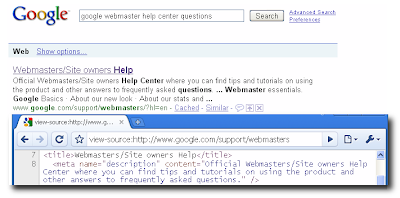2009년 9월 21일 월요일
최근 Google에서는 웹 검색결과의 순위를 지정할 때 keywords meta 태그를 어떻게 사용하는지(또는 더 정확하게는 사용하지 않는지)에 관한 질문을 받았습니다. 웹사이트 소유자인 앨리스와 밥이 있다고 가정해 보겠습니다. 앨리스는 AliceCo라는 회사를 운영하고 밥은 BobCo를 운영합니다. 어느 날 밥의 사이트를 살펴보다가 앨리스는 자신의 keywords meta 태그에서 사용하는 단어 몇 개를 밥이 복사했음을 알게 되었습니다. 더 흥미로운 점은 밥이 본인이 사용하는 keywords meta 태그에 'AliceCo'라는 단어를 추가했다는 사실입니다. 앨리스는 이 점에 관해 걱정해야 할까요?
적어도 현재(2009년 9월) Google의 웹 검색결과의 경우에는 걱정하지 않아도 됩니다. Google은 웹 검색 순위에서 keywords meta 태그를 사용하지 않습니다. 자세한 내용은 이 동영상이나 아래 질문을 참고하세요.
Google은 웹 검색 순위를 지정할 때 keywords meta 태그를 사용하나요?
결론부터 말하자면 사용하지 않습니다. Google은 Google Search Appliance를 판매하며 이 제품에는 keywords meta 태그가 포함될 수 있는 meta 일치 기능이 있습니다. 그러나 이는 Google의 기본 웹 검색과 별도로 제공되는 기업용 검색 기능입니다. 매일 수억 명의 사용자가 이용하며 잘 알려진 Google.com을 통해 제공되는 Google의 웹 검색에서는 keywords meta 태그를 완전히 무시합니다. 현재 이러한 메타 태그는 검색 순위에 아무런 영향도 미치지 않습니다.
Google에서 keywords meta 태그를 사용하지 않는 이유는 무엇인가요?
약 10년 전에는 검색엔진이 웹페이지에 있는 콘텐츠만 기반으로 하여 페이지를 판단했으며, 웹페이지로 연결되는 링크와 같은 이른바 '페이지 외' 요소는 고려하지 않았습니다. 당시 키워드 관련 메타 태그는 일반적인 방문자가 키워드를 보지 않고도 종종 관련 없는 키워드를 입력할 수 있는 영역이 되었습니다. keywords meta 태그는 악용되는 경우가 많았으므로 Google에서는 몇 년 전부터 keywords meta 태그를 무시했습니다.
그러면 Google에서는 모든 meta 태그를 무시하나요?
아니요, Google은 다른 여러 meta 태그를 지원합니다. 이 meta 태그 페이지에는 Google에서 사용하는 여러 meta 태그에 관한 자세한 정보가 나와 있습니다. 예를 들어, 다음 스크린샷과 같이 description meta 태그를 검색결과 스니펫의 텍스트로 사용하기도 합니다.

표시되는 스니펫에 description meta 태그를 사용하기도 하지만 순위에는 여전히 description meta 태그를 사용하지 않습니다.
그러면 Google에서는 keywords meta 태그를 항상 무시하나요?
나중에 이 정보를 Google에서 사용할 수도 있지만 가능성은 작습니다. Google은 수년간 keywords meta 태그를 무시해 왔으며 지금에 와서 이 정책을 변경할 필요가 없다고 봅니다.
